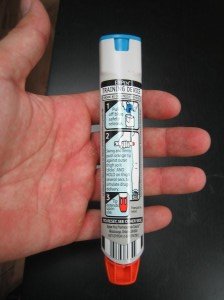Shellfish allergy is an allergic reaction once an individual eats shellfish. Oftentimes, this type of allergy is only due to certain types of shellfish or to all shellfish. Shellfish typically includes marine creatures that have shells such as crabs, shrimps, lobsters and even octopus and squid.
Shellfish allergy can cause mild symptoms such as nasal congestion or hives but life-threatening symptoms can also develop. Individuals who have shellfish allergy should consult their doctor so that tests can be performed to confirm the allergy.
Symptoms of shellfish allergy
The symptoms of shellfish allergy typically develop in just a matter of minutes after eating shellfish.
- Itching, hives or eczema
- Nasal congestion, wheezing or difficulty breathing
- Swelling of the face, lips, tongue, throat or other body parts
- Dizziness or lightheadedness
- Abdominal pain, nausea and vomiting
- Tingling sensation in the mouth
Anaphylaxis is a severe allergic reaction to shellfish that is considered life-threatening if it interferes with breathing. This is considered as a medical emergency that requires immediate treatment with an epinephrine injection and a trip to the emergency room.
Causes of shellfish allergy
Always bear in mind that allergies to food are caused by immune system problems. Understandably, the immune system recognizes the shellfish proteins as harmful, thus triggering the production of antibodies. These antibodies will recognize the allergens and the immune system will trigger the release of histamine that causes the symptoms.
Histamine is partially responsible for majority of allergic responses including itchy eyes, runny nose, rashes, nausea, dry throat, breathing difficulties, diarrhea and even anaphylactic shock in some cases.
Treating shellfish allergies

The best way to prevent an allergy from occurring is to avoid shellfish and products that contain shellfish. In case an individual comes in contact with shellfish, a mild allergic reaction can be treated with antihistamines in order to minimize the signs and symptoms. The antihistamines can be taken right after exposure to shellfish in order to control the reaction as well as help relieve any discomfort.
For those who have a severe allergic reaction to shellfish, an emergency shot of epinephrine is required. Individuals who are at risk for a severe reaction should have an injectable epinephrine such as an EpiPen all the time. An EpiPen shot should be administered if symptoms such as swollen throat, breathing difficulty, chest tightness, wheezing and dizziness are present. After the epinephrine shot is given, seek immediate medical care.
Preventing shellfish allergy from occurring
Once you have determined that you are allergic to shellfish, the best way to avoid an allergic reaction is to avoid shellfish or products that contain shellfish. Take note that even minimal traces of shellfish can trigger a severe reaction in some individuals.
- Be careful when eating outside. Always bear in mind that eating at restaurants poses the highest danger of eating shellfish by mistake.
- Be careful when eating at seafood restaurants. Eating in a seafood restaurant poses a higher risk of cross-contamination since some of the foods served might have small traces of shellfish.
- Always read the food labeling carefully. During the manufacturing process, cross-contamination can also occur. Food companies should provide clear labels on products that contain even minor amounts of shellfish.
